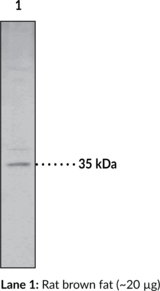Description
Sphingolipids play essential roles in various cellular events, including proliferation, differentiation, senescence, apoptosis, and inflammatory responses.{12350} Serine palmitoyltransferase (SPT) is the initial and rate-limiting enzyme in the de novo sphingolipid biosynthesis, and thus regulates the level of sphingolipids in cells.{12348} Immunohistochemical study revealed widespread distribution of the enzyme with most strong expression in brain and digestive tract.{12347} Two subunits, SPT1 and SPT2 at a stoichiometry of 1:1, are involved in the enzymatic activity of SPT.{12349} Cayman Chemical’s SPT2 Polyclonal Antibody recognizes SPT2, the long chain subunit of the enzyme. The antibody stains mainly cell nuclei and occasionally both cell nuclei and cytoplasm in formalin-fixed, paraffin-embedded rat brain tissue. The nuclear localization of SPT2 may suggest that SPT2 associates with another nuclear protein or is modified and transported to the nucleus.{12348}
Synonyms: Long Chain Biosynthesis Protein 2 (LCB2)|Serine-palmitoyl-CoA transferase 2 (SPT2)
Immunogen: Synthetic peptide from the C-terminal region of human SPT2
Formulation: Peptide affinity-purified IgG
Isotype:
Applications: IHC and WB
Origin: Animal/Rabbit
Stability: 365 days
Application|Immunohistochemistry||Application|Western Blot||Product Type|Antibodies|Polyclonal Antibodies||Research Area


